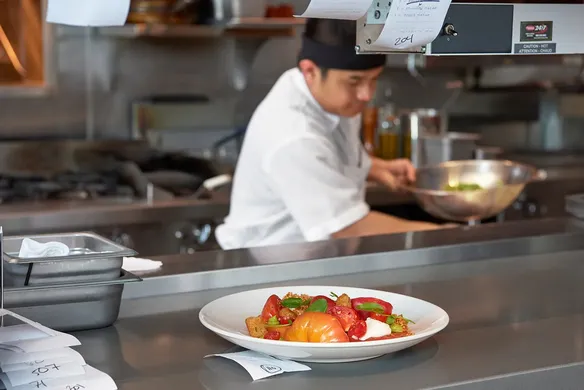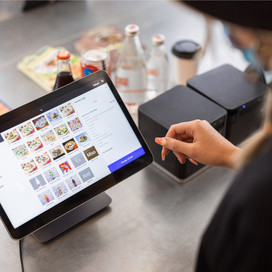Table of contents
As many restaurant owners know, there’s more to owning a successful restaurant than landing a trendy location or coming up with a great concept. While these things are important, understanding restaurant safety, such as food health and safety practices in restaurants, is essential if you want your business to be successful. It’s one of the first things you tackle when you are starting a restaurant.
The number of food standards, food handling licenses, and overall safety restrictions can make any new restaurant owner’s head spin. And learning how to manage your restaurant during COVID-19 and adapt to the new normal is tough enough. We want to make it easier for you to navigate the fundamentals of the industry by exploring restaurant regulations and specifics you need to know to adhere to restaurant food safety standards.
Government Departments and Agencies Responsible for Restaurant Food Safety Regulation
Every restaurant owner should be familiar with Australia’s safe food system. The Food Standards Australia New Zealand (FSANZ) oversees restaurant safety and security by developing standards that regulate the majority of all food and food ingredients offered for sale. FSANZ executes these regulatory requirements that all restaurants must follow in several ways. Below are three examples:
- The FSANZ Food Code explains best practices for food handling and preservation to keep consumers safe and help reduce the risk of foodborne illnesses. In turn, others may use the Food Code as a model to develop or update their own restaurant food safety regulations and to be consistent with national food regulatory policy.
- Do you have a special sauce that you plan to sell at the front of your restaurant? You should be aware of FSANZ’s food labelling standards. Restaurants that decide to sell packaged food items need to meet certain compliance criteria. The food labelling standards provide guidance on general food labelling requirements, ingredient lists, and nutrition labelling.
- The FSANZ Food Safety Management Standards provide guidance on restaurant food safety programs, practices, equipment, and general requirements for the foodservice sector. These standards only apply to Australia.
Compliance with the Food Code in Australia is monitored by state and territory authorities. So it’s important to check your state’s or territory’s enforcement agency and become familiar with particular local policies and restrictions. The Implementation Subcommittee for Food Regulation (ISFR) provides high-level advice to FSANZ and aims to standardise state- and territory-level approaches to food safety enforcement.
The Australian Government’s Department of Health has created several educational resources for the public, including the Australian Dietary Guidelines. Last updated in July 2019, the Dietary Guidelines provide information on new health findings and give recommendations that promote a healthier lifestyle. Due to its importance in our health-conscious community, restaurant owners should be aware of any shifts in healthy eating habits so they can refine their menu and adapt portion sizes as appropriate.
Other Standards and Regulations that Affect Restaurants
Aside from the restaurant industry government regulations on food safety, there are a few other things that affect the operations of a new restaurant.
Overhead Costs
Recurring expenses and fixed costs—such as rent, utilities, insurance, salaries, payroll costs, superannuation contributions, and other government fees—and variable costs like equipment repairs are all overhead costs that you need to be aware of as you continue to run your restaurant business.
Overtime
Full-time hourly restaurant employees are entitled to overtime at the rate of 1.5 times their regular rate of pay for the first two hours worked over 38 hours in a working week. For overtime hours worked after the initial two hours, they’re entitled to double their regular rate of pay.
Overtime pay may not apply to salaried employees, those under a certain age, or those who work part-time or are casual employees. Check the Australian Government’s Fair Work website to understand the pay rates for all of your employees under the Restaurant Industry Award.
Tracking employee hours can help you better manage overtime at your restaurant. To make this process easier, use a payroll service that automatically uploads timecards and calculates employee salaries, hourly rates, and overtime.
Minimum Wage
When managing your front of house and back of house employees, you’ll want to have a thorough understanding of the minimum wage laws. According to the Restaurant Industry Award 2020 set by the Fair Work Commission, the minimum pay rate for full-time adult employees at the Introductory level is $19.49 per hour, or $740.80 per 38-hour work week. Make sure to follow all current minimum wage laws and determine how best to manage future increases through hiring and production. Visit the Fair Work website for more information about minimum wages.
Permits and Licences for Your Restaurant
Once you understand the regulations and policies that your restaurant must abide by, it’s time to take the plunge to register your business and obtain a business licence.
In general, an owner must first select a business name and then register it with the government. Some of the legal paperwork that falls within the business registration process includes:
- Selecting a business structure (e.g., sole trader, partnership, company, etc.)
- Applying for an Australian Business Number (ABN)
- Registering for government and local taxes (you’ll need to register for Goods and Services Tax [GST], if you’re planning on selling labelled food products in your restaurant)
Governmental entities and local councils may require additional business licenses. Be sure to check your state’s or territory’s business licensing guidelines for additional information.
You’ll also need to develop a restaurant Food Safety Program, based on FSANZ’s food standards code, that lays out your restaurant’s health and safety policy. Update the document regularly, and keep it on your restaurant’s premises. Your state or territory health authority could audit your business for restaurant safety at any time to make sure you’re complying with food laws and regulations.
You may also need additional permits from various agencies such as your local wastewater and waste disposal departments, land services department, and department of public works, to name just a few.
Finally, there are other permits and licensing fees that don’t necessarily pertain to restaurant food safety but are important for restaurant owners to evaluate and potentially carry out. Here are some additional questions to ask yourself in order to determine what other licences or permits you may need to obtain:
- Are you building a new facility from the ground up or renovating an existing space? Those building a new facility need to apply for building and construction certificates and receive a development consent with your local council. Blueprints for your newly established restaurant may also need the approval of city departments before construction occurs.
- Will you be serving liquor? If you are manufacturing or selling liquor at your restaurant, you’re required to apply for and obtain a liquor licence. Any employees who will be serving or selling alcohol must apply for a Responsible Service of Alcohol (RSA) certificate, which entails completing RSA training.
- Will there be music or TVs at the restaurant? Paying a subscription to stream services like Spotify doesn’t cut it, and your restaurant may face major fines without securing proper play copyrighted music in your business.
How to Pass A Restaurant Health Compliance Check
State or territory health authorities will send out an official to assess food safety and sanitation practices in restaurants. These audits can be rigorous when you open a restaurant, which is why it is important for you and your staff to be on your A-game when it comes to restaurant safety.
To understand restaurant compliance requirements and prepare for compliance checks in your restaurant, here’s a checklist:
- Educate your staff. It is important to inform your staff about the restaurant health audit and provide education on food handling.
- Stress employee hygiene. All employees are directly responsible for their hygiene, and their cleanliness is graded during a health inspection. To reiterate this, many restaurants post signs in bathrooms prompting employees to wash their hands as an effective reminder.
- Check your drains. To prevent bacteria from building up, check your drains regularly and call a plumber immediately if you notice the drainage system slowing.
- Assess food temperature control. Make sure your cold food is cold and your hot food is hot. In general, cold food should be kept at or below 5°C and hot food shouldn’t fall below 60°C. Rapid growth of bacteria can occur between 5°C and 60°C, so it is crucial to keep food from falling into this danger zone.
- Evaluate expiration dates. Check perishable foods regularly. Throw out anything questionable—it’s not worth the health risk.
- Be aware of potential contamination. Keep similar foods stored together and properly contained to mitigate cross-contamination risk.
- Emphasise restaurant sanitation. Whether it is the kitchen, the dining room, or the toilets, all surfaces and floors should be properly sanitised.
- Take care of pests. Ensure that your restaurant has gone through the proper pest control by applying pest prevention techniques in your facility.
- Store waste correctly. Dispose of all solid waste from food prep daily and keep the rubbish area clean. Any waste can create an infestation of bugs, mould, or other health hazards, which could compromise your health compliance check.
- Keep operational records. In the event that something faulty shows up during the health compliance check, it is important to have proper operational documentation. Ensuring that you went through all the proper protocols leading up to a health audit can better prepare you for any unexpected results.
In addition to food handling and sanitation, some local authorities may inspect your restaurant to assess workplace safety. Be sure to review your state or territory’s Work Health and Safety laws to ensure employee safety at your restaurant.
Restaurant Penalties and Fines
Not abiding by restaurant safety regulations, disregarding local health policies, failing to pass compliance checks, and not acquiring the correct permits or licences are just a few of the situations that can result in fines. To avoid these unwanted costs, it is important to be aware of when you could face fines.
Types of violations that result in costly restaurant fines include:
- Cleanliness and sanitation of surfaces (both food and non-food handling surfaces)
- Equipment and utensil sanitation and storage
- Adequate handwashing
- Presence of poisonous or toxic items
- Food temperatures (both when stored and prepared)
- Food labelling violations
- Wage violations
As you can tell, a lot goes into keeping our food safe. Restaurant industry government regulations, licences, and audits can get complex, but staying compliant with industry standards is mandatory. Understanding the basic principles of restaurant safety and the fundamentals of health policies and regulations sets you up for success as a restaurant owner.
![]()











